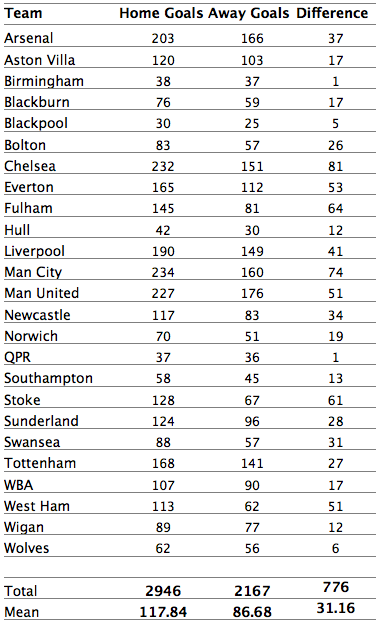The League Cup semi-final second legs were played this week. In the end, whilst Chelsea and Tottenham’s aggregate wins (over Liverpool and Sheffield United respectively) were settled by conventional means, there were stages of both games where they were set to win via the Away-Goals rule. This rule would only have come into play after extra time of course, which I personally find more acceptable than after only 90 minutes, but losing a game because of this rule always feels cheap. This got me thinking about the logic of the Away-Goals rule and whether it made any sense anymore in modern football. The tactical consequences of the Away-Goals rule have been explored previously (see here and here) but I was more interested in whether it made statistical sense.
The purpose of the Away-Goals rule is to fairly separate two teams in the event of a tie without the need to go to penalties. The idea is that Away goals count extra due to the premise that they are more difficult to score. If they are harder to score they should therefore be seen less frequently. This premise is easily tested by comparing the number of Away goals with the number of Home goals. If the difference is significant (and in the right direction) then it will support the logic of the rule.
To test the premise I looked at the last 5 seasons of the Premier League (2009/10 to 2013/14) and totalled up all the Away goals and Home goals scored by all teams. To avoid any one side in one particular season from skewing the data I decided to only include teams that had been in the league for two or more of the five seasons I looked at. This meant I included Hull (09/10 and 13/14) for instance but not Reading (12/13). The results can be seen in Table 1.
Interestingly Chelsea had the biggest difference having scored 81 more Home goals than Away goals in the 5 year period. On the opposite end of the scale is QPR who in their two seasons of Premier League football only scored 1 less Away goal. Taken as a whole group though, there was a mean difference of 31 less Away goals than Home goals. As this was based on the totals for 5 seasons, this roughly equates to on average 6 less Away goals than Home goals per team per season.
We can actually statistically calculate whether this mean difference is significant or not by completing a paired t-test (paired means that the same teams are participating in each condition – in this context, Home and Away). The result of the paired t-test is t=6.7741 (p<0.0001) which in layman’s terms means that the difference is extremely significant and suggests we can reject the idea that Away goals are scored just as frequently as Home goals. In actual fact, based on the data sample I looked at, Away goals occur significantly less frequently than Home goals. If we assume that teams are always trying to score no matter whether they are the Home or Away side then we can also assume that Away goals are harder to score. This therefore (annoyingly) provides some statistical support for the Away Goals rule.
Having provided this support however there might still be a reason why the Away Goals rule is not the most logical way to separate two teams who are drawing in a two-legged cup tie. For those that love football and numbers there is a fantastic book by Chris Anderson and David Sally called The Numbers Game. In this they look at whether scoring a goal or keeping a clean sheet is more productive in terms of winning points. They found that keeping a clean sheet on average produces almost 2.5 points per match whereas scoring a goal typically only produces just over 1 point. This begs the question that if we have to choose a game variable to determine a result why not make it the team that managed to keep an Away clean sheet rather than the team that scored the Away goal? After all, clean sheets are more important than goals.
So had Ivanovic not scored in extra time for Chelsea against Liverpool on Tuesday night and the game finished 0-0 (1-1) I think Liverpool should have won on the Away clean sheet rule.
What do you think about the Away Goals rule? Does it make sense or not?
Psychobob
Latest posts by Psychobob (see all)
- Countdown to the Spurs 2015/16 Season…. 1 Day - August 7, 2015
- Countdown to the Spurs 2015/16 Season… 2 Days - August 6, 2015
- Countdown to the Spurs 2015/16 Season… 3 Days - August 5, 2015


The fact a team can over two legs, lose neither and still go out can’t be right.
Yes, totally agree. But if two teams are tied on goals there does need to be some way of separating them. I think an Away Clean sheet rule AND an Away Goals rule would be quite entertaining! But only after ET so effectively a sub for pens.